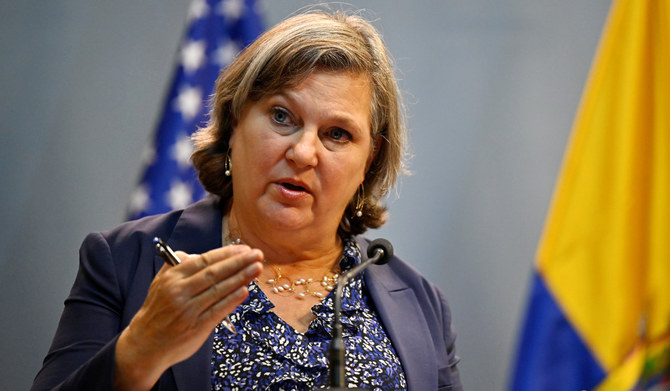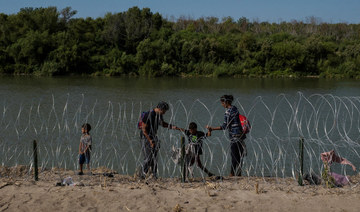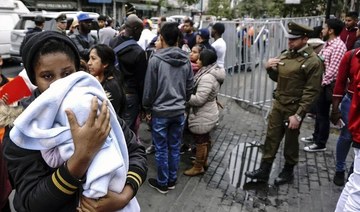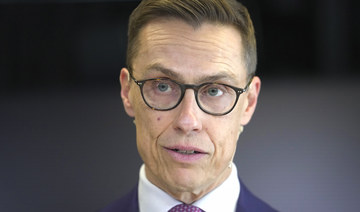NIAMEY, Niger: A senior US diplomat said coup leaders in Niger refused to allow her to meet Monday with the West African country’s democratically elected president, whom she described as under “virtual house arrest.”
Acting Deputy Secretary of State Victoria Nuland also described the mutinous officers as unreceptive to US pressure to return the country to civilian rule.
“They were quite firm about how they want to proceed, and it is not in support of the constitution of Niger,” Nuland told reporters. She characterized the conversations as “extremely frank and at times quite difficult.”
She spoke after a two-hour meeting in Niger’s capital, Niamey, with some leaders of the military takeover of a country that has been a vital counterterrorism partner of the United States.
In speaking to junta leaders, Nuland said, she made “absolutely clear the kinds of support that we will legally have to cut off if democracy is not restored.”
If the US determines that a democratically elected government has been toppled by unconstitutional means, federal law requires a cutoff of most American assistance, particularly military aid.
She said she also stressed US concern for the welfare of President Mohamed Bazoum, who she said was being detained with his wife and son.
The meeting was with Gen. Moussa Salaou Barmou, a US-trained officer, and three of the colonels involved in the takeover. The coup’s top leader, former presidential guard head Abdourahamane Tchiani, did not meet with the Americans.
In other developments Monday, leaders of West Africa’s regional bloc said they would meet later this week to discuss next steps after the junta defied a deadline to reinstate the president. The meeting was scheduled for Thursday in Abuja, the capital of neighboring Nigeria, according to a spokesman for the ECOWAS bloc.
Meanwhile, the junta’s mutinous soldiers closed the country’s airspace and accused foreign powers of preparing an attack.
State television reported the junta’s latest actions Sunday night, hours before the deadline set by ECOWAS, which has warned of using military force if Bazoum is not returned to power.
A spokesman for the coup leaders, Col. Maj. Amadou Abdramane, noted “the threat of intervention being prepared in a neighboring country,” and said Niger’s airspace will be closed until further notice. Any attempt to fly over the country will be met with “an energetic and immediate response.”
The junta also claimed that two central African countries were preparing for an invasion, but did not name them. It called on Niger’s population to defend the nation.
The coup toppled Bazoum, whose ascendency was Niger’s first peaceful, democratic transfer of power since independence from France in 1960. The coup also raised questions about the future of the fight against extremism in Africa’s Sahel region, where Russia and Western countries have vied for influence.
Niger had been seen by the United States and others as the last major counterterrorism partner in the Sahel, south of the Sahara Desert, where groups linked to Al-Qaeda and the Daesh group are expanding their influence.
Also Monday, Mali said it and Burkina Faso, both neighbors of Niger run by military juntas, were sending delegations to Niger to show support. Both countries have said they would consider any intervention in Niger as a declaration of war against them.
Regional tensions have mounted since the coup nearly two weeks ago, when mutinous soldiers detained Bazoum and installed Tchiani as head of state. Analysts believe the coup was triggered by a power struggle between Tchiani and the president, who was about to fire him.
It was not immediately clear what ECOWAS leaders will do now. The region is divided on a course of action. There was no sign of military forces gathering at Niger’s border with Nigeria, the likely entry point by land.
Nigeria’s Senate has pushed back on the plan to invade, urging Nigeria’s president, the bloc’s current chair, to explore options other than the use of force. ECOWAS can still move ahead, as final decisions are made by consensus by member states.
Guinea and neighboring Algeria, which is not an ECOWAS member, have come out against the use of force. Senegal’s government has said it would participate in a military operation if it went ahead, and Ivory Coast has expressed support for the bloc’s efforts to restore constitutional order.
The junta has asked for help from the Russian mercenary group Wagner, according to Wassim Nasr, a journalist and senior research fellow at the Soufan Center.
However, Nuland indicated that coup leaders did not seem receptive to welcoming Wagner mercenaries into the country, as has happened with several surrounding unstable West African countries.
“I will say that I got the sense from my meetings today that the people who have taken the action here understand very well the risks to their sovereignty when Wagner is invited,” Nuland said.
The junta is exploiting anti-French sentiments to shore up its support base and has severed security ties with France, which still has 1,500 military personnel in Niger for counterterrorism efforts.
On Monday, France’s Ministry of Foreign Affairs formally discouraged any travel to Niger, Burkina Faso or Mali, and called on French nationals to be extremely vigilant. France has suspended almost $500 euros ($550 million) in aid to Burkina Faso.
It’s not clear what will happen to the French military presence, or to the 1,100 US military personnel also in Niger.
Many people, largely youth, have rallied around the junta, taking to the streets at night to patrol after being urged to guard against foreign intervention.
“While they (jihadists) kill our brothers and sisters ... ECOWAS didn’t intervene. Is it now that they will intervene?” said Amadou Boukari, a coup supporter at Sunday’s rally. “Shame on ECOWAS.”



























